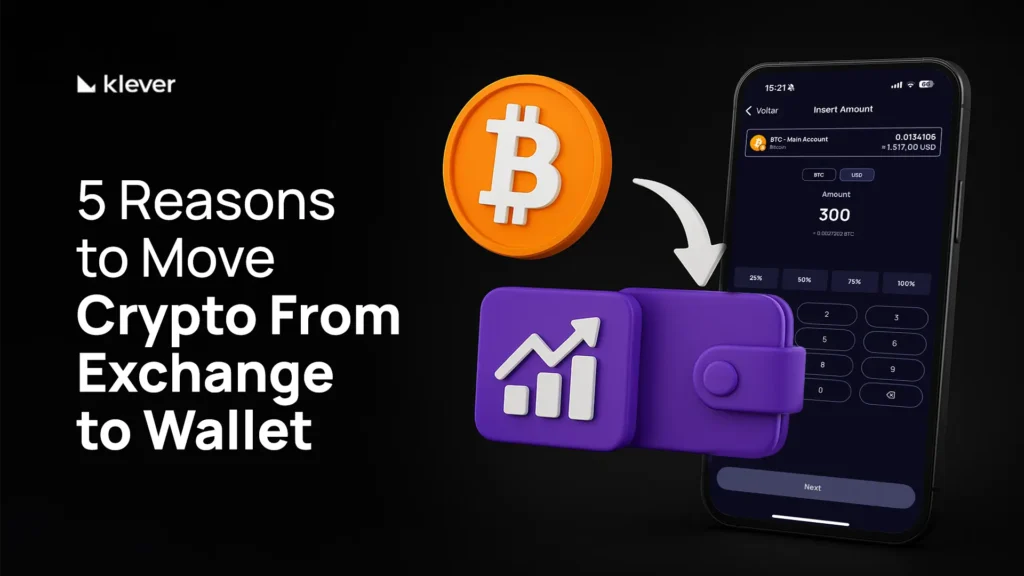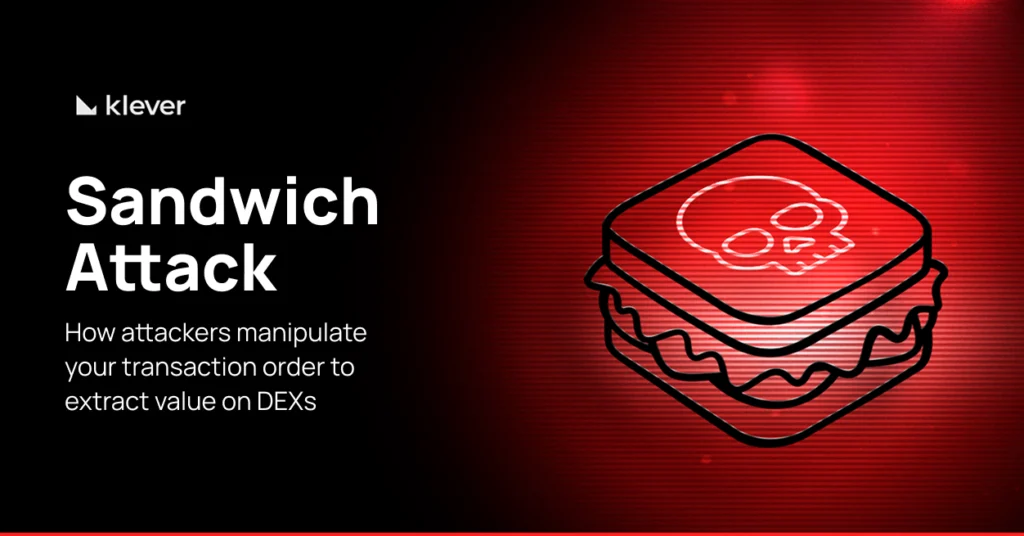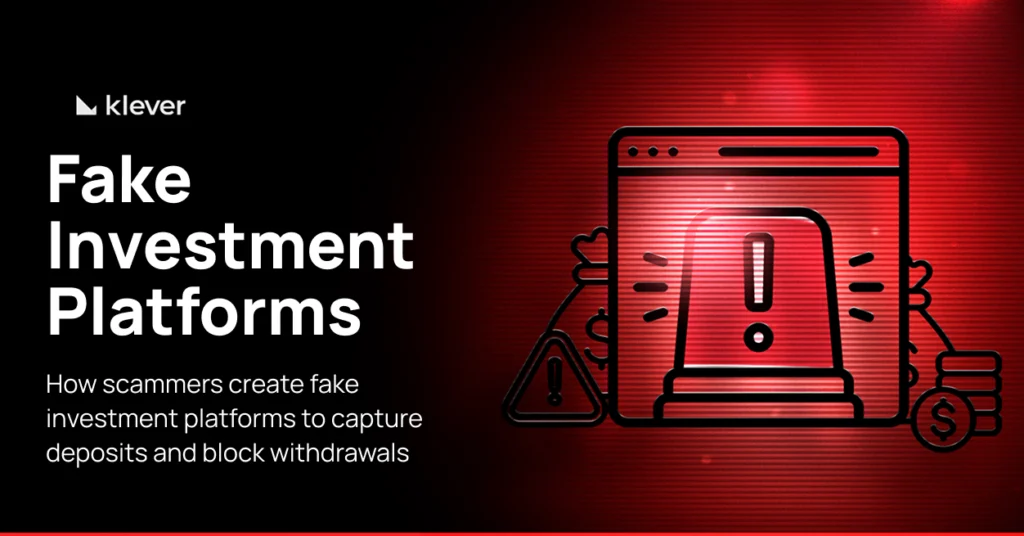
When you buy crypto, that’s just the first step — the real decision is where to keep it. Most people leave their assets on an exchange because it’s fast and easy. But convenience comes with risk. Exchanges have been frequent targets of major hacks, insider fraud, and regulatory crackdowns that have locked users out of their funds.
This guide gives you 5 reasons to move crypto from exchange and explains why moving them to a crypto wallet is a smart step toward real ownership and better security. You’ll learn the biggest risks of keeping crypto on exchanges — and how personal wallets like Klever Wallet can give you full control, protection, and peace of mind.
Why Move Crypto From Exchange to Wallet?
Exchanges are essential platforms for anyone looking to buy cryptocurrencies quickly and at low cost. However, storing your digital assets on these platforms comes with significant risks. Because they are constant targets of cybercriminals, exchanges have seen hundreds of thousands of Bitcoins lost to hacks over the years — as we’ll see below.
Furthermore, these platforms have no legal obligation to reimburse users in the event of a breach. Some may choose to cover the losses using their own funds or insurance reserves, but that’s the exception, not the rule.
Another major concern is that when using a centralized exchange, your personal data is also at risk. These platforms store sensitive information that can be exploited in cyberattacks.
For these reasons, keeping your crypto on exchanges is not a safe option for long-term storage. Those looking to protect their investments more reliably should consider alternatives like hardware wallets or non-custodial digital wallets, such as Klever Wallet, which offers an intuitive interface, biometric authentication support, PIN security, and seed phrase backup.
By understanding these risks and taking proactive steps, you significantly improve the security of your crypto assets and avoid losses that are often preventable:
1. Vulnerability to Hacks
One of the most significant risks associated with storing cryptocurrencies on exchanges is their susceptibility to cyber-attacks. Exchanges are high-value targets for hackers due to the vast amounts of assets they manage.
History has shown us that even the largest and seemingly most secure platforms can fall victim to security breaches, leading to substantial financial losses for users.
Major incidents such as the Mt. Gox collapse and numerous other exchange hacks, as we will see below, highlight the dangers of relying on these centralized platforms for storing crypto assets.
2. Lack of Control Over Your Assets
When you store your cryptocurrencies on an exchange, you essentially relinquish control of your private keys to the platform. Private keys are critical for accessing and managing your digital assets. Without control over these keys, you are at the mercy of the exchange’s security measures and operational integrity.
If the exchange faces regulatory issues, goes bankrupt, or decides to freeze your account, accessing your funds could become challenging or impossible.
The golden rule in the crypto space sums it up well: “Not your keys, not your coins.”
The decision to move crypto from exchange to wallet ensures that you retain full control over your digital assets.
3. Exposure to Regulatory Risks
Exchanges are subject to government regulations, which can vary significantly between jurisdictions and may change rapidly.
If an exchange fails to comply with regulatory requirements, it could be shut down or forced to suspend operations, potentially leading to the freezing or loss of your assets.
This regulatory uncertainty adds an additional layer of risk for those who choose to store their cryptocurrencies on exchanges.
Moving your crypto from the exchange to a wallet helps avoid these risks.
4. Susceptibility to Internal Fraud
There’s also the risk of internal fraud within the exchange.
The collapse of FTX, allegedly due to misuse of customer funds, highlights how internal mismanagement can lead to catastrophic losses for users who have stored their assets on an exchange.
5. Limited Crypto Availability
Many exchanges do not support every cryptocurrency available. This limitation can be restrictive if you wish to trade or hold a diverse portfolio of digital assets.
Private wallets typically offer more flexibility in holding various cryptocurrencies that might not be available on all exchanges
Recent Risks Involving Exchange Attacks
Recent cyberattacks on cryptocurrency exchanges have highlighted the vulnerabilities inherent in centralized platforms. Notable incidents include:
Bybit Exchange Breach (February 2025)
In February 2025, Bybit, a Dubai-based cryptocurrency exchange, suffered a significant security breach. Hackers affiliated with North Korea’s Lazarus Group, specifically the TraderTraitor subgroup, exploited vulnerabilities in Bybit’s cold wallet infrastructure, resulting in the theft of approximately $1.5 billion worth of Ethereum. The attackers employed sophisticated malware and phishing tactics to infiltrate the system. The stolen assets were rapidly laundered through various blockchains, complicating recovery efforts.
2. WazirX Exchange Hack (July 2024)
In July 2024, Indian cryptocurrency exchange WazirX experienced a cyberattack that led to the loss of around $235 million in digital assets. The Lazarus Group orchestrated the attack by creating a fake account on the platform, depositing tokens, and manipulating the multisignature wallet system to gain unauthorized access. This breach forced WazirX to halt operations and sparked legal actions from affected parties, including a lawsuit from rival exchange CoinSwitch.
3. DMM Bitcoin Theft (May 2024)
In May 2024, Japan-based exchange DMM Bitcoin fell victim to a cyberattack resulting in the theft of approximately $308 million worth of Bitcoin. The Lazarus Group employed social engineering tactics, impersonating a recruiter to deliver malware to an employee, thereby gaining access to the exchange’s systems. This incident contributed to a total of over $650 million stolen by North Korean hackers in 2024 alone
How to Stay Safe in Web3
To safeguard your digital assets against such threats, consider implementing the following security practices:
- Move Assets to Secure Wallets: Transferring your crypto from exchanges to personal wallets reduces the risk of losing your assets in an exchange hack. By holding your private keys, you retain full control over your cryptocurrencies.
- Use Multi-factor Authentication (MFA): Enable MFA on all accounts related to your cryptocurrency transactions. This adds an extra layer of security beyond just a password.
- Regular Security Audits: Conduct frequent security audits of your crypto wallets and associated accounts to identify potential vulnerabilities before they can be exploited.
- Stay Updated: Ensure your wallet and any related software are up to date with the latest security patches and updates.
- Educate Yourself on Phishing Scams: Be vigilant about phishing attempts. Learn to recognize suspicious emails and links that could lead to unauthorized access to your accounts.
Ready to Move Crypto From Exchange to Wallet?
If you’re ready to protect your digital assets and stop depending on centralized exchanges, choosing a secure wallet is your next step. Klever Wallet is a trusted, self-custodial solution that gives you full control — without compromising on usability.
Why Use Klever Wallet?
- Self-Custodial Security
With Klever Wallet, you are the only one who holds your private keys. Your crypto stays in your hands — not on a platform that could freeze, seize, or lose your funds. - Multi-Chain Compatibility
Manage a wide range of assets including Bitcoin, Ethereum, Solana, BNB Chain, Polygon, and Tron — all in one place. - Accessible Across Devices
Klever Wallet is available as a mobile app and browser extension, giving you flexibility to manage your crypto anywhere. - Advanced Security Features
Your private keys are encrypted and stored locally on your device. Klever Wallet also supports PIN protection and biometric authentication. - Integrated Crypto Purchase
Buy crypto directly inside the wallet using credit cards, Apple Pay, Google Pay or bank transfers. - User-Friendly with Advanced Tools
Designed for both beginners and advanced users, Klever Wallet includes tools for staking, swapping tokens, and native browser for you to make it easier and safer interactions with DeFi platforms and Dapps.
Moving crypto from exchange to wallet is one of the most important steps to secure your assets. Klever Wallet simplifies that process, giving you ownership, protection, and freedom — all in one app.
Download Klever Wallet and make your crypto truly yours.
Be Klever.




